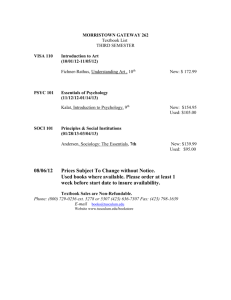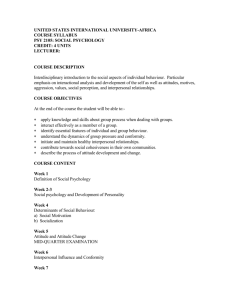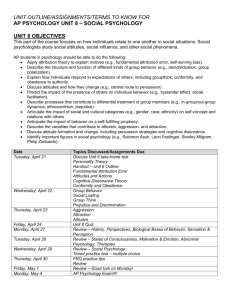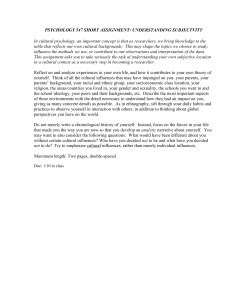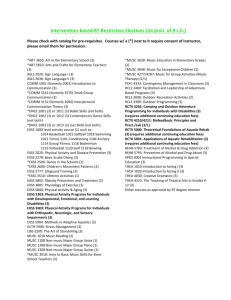SOCI 2450 - Metropolitan Community College
advertisement
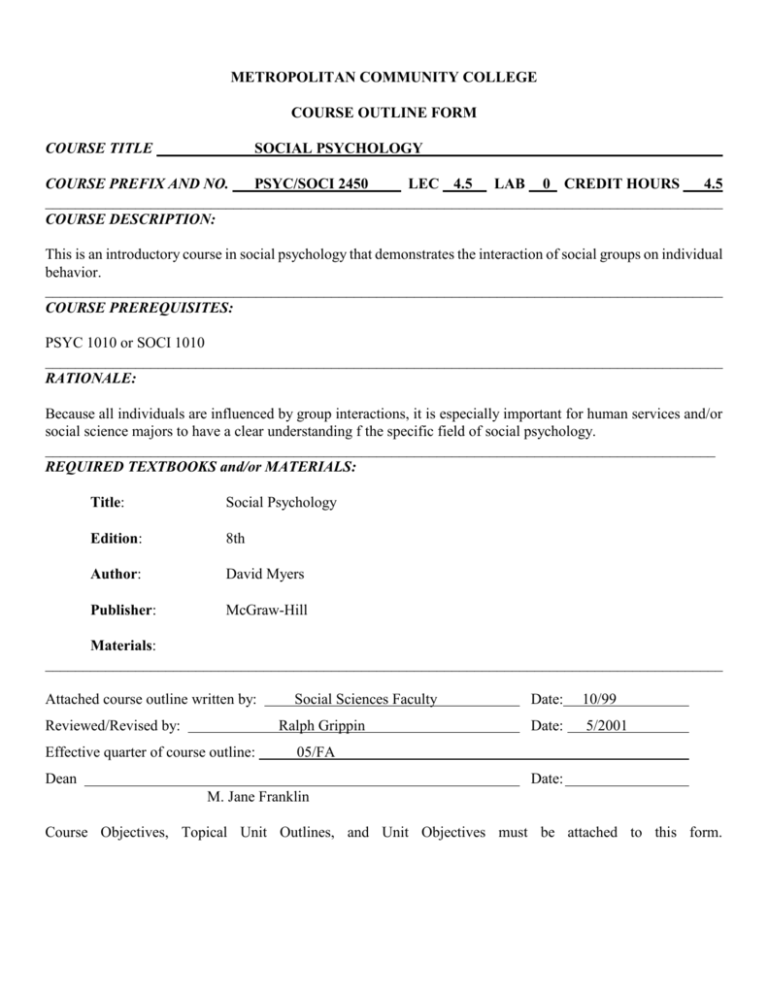
METROPOLITAN COMMUNITY COLLEGE COURSE OUTLINE FORM COURSE TITLE SOCIAL PSYCHOLOGY COURSE PREFIX AND NO. PSYC/SOCI 2450 LEC 4.5 LAB 0 CREDIT HOURS 4.5 __________________________________________________________________________________________ COURSE DESCRIPTION: This is an introductory course in social psychology that demonstrates the interaction of social groups on individual behavior. __________________________________________________________________________________________ COURSE PREREQUISITES: PSYC 1010 or SOCI 1010 __________________________________________________________________________________________ RATIONALE: Because all individuals are influenced by group interactions, it is especially important for human services and/or social science majors to have a clear understanding f the specific field of social psychology. _________________________________________________________________________________________ REQUIRED TEXTBOOKS and/or MATERIALS: Title: Social Psychology Edition: 8th Author: David Myers Publisher: McGraw-Hill Materials: __________________________________________________________________________________________ Attached course outline written by: Reviewed/Revised by: Social Sciences Faculty Ralph Grippin Effective quarter of course outline: Date: 10/99 Date: 5/2001 05/FA Dean Date: M. Jane Franklin Course Objectives, Topical Unit Outlines, and Unit Objectives must be attached to this form. COURSE OBJECTIVES/TOPICAL UNIT OUTLINE/UNIT OBJECTIVES TITLE: SOCIAL PSYCHOLOGY PREFIX/NO. PSYC/SOCI 2450 COURSE OBJECTIVES: At the successful completion of this course, each student will be able to: 1. Appraise the impact of social groups on individual behavior. 2. Evaluate the relative usefulness of various research techniques within the field. 3. Compare behaviors with attitudes in terms of predictive capabilities. 4. Estimate the role of various attributions in the explanation of behavior. 5. Evaluate the impact of cultural influences on social behavior. 6. Examine the various social characteristics that influence the process of conformity. 7. Evaluate the impact of the communicator, message, and channel of communication on persuasion. 8. Compare various theories of aggression. 9. Examine the social variables that influence interpersonal attraction. 10. Estimate situational and personal influences on altruism. __________________________________________________________________________________________ TOPICAL UNIT OUTLINE: I. Introduction to Social Psychology II. Social Thinking A. B. C. III. Attitudes Behavior Applications Social Influence A. Cultural influence TOPICAL UNIT OUTLINE: B. C. D. IV. Conformity Persuasion Group influence Social Relations A. Aggression B. Prosocial behavior C. Prejudice and discrimination D. Attraction __________________________________________________________________________________________ TOPICAL UNIT OBJECTIVES: I. Introduction to Social Psychology A. B. II. Social Thinking A. B. C. D. E. III. Describe research findings on the relationship between attitudes and behavior. Identify the assumptions, questions, and general findings of attribution theory. Paraphrase and give examples of the fundamental attribution errors. Interpret the illusions of personal correlation and personal control. Characterize ways our preconceptions control our interpretations and memories. Social Influence A. B. C. D. E. F. G. H. I. IV. Define social psychology and give examples of the discipline's central concerns. Describe two major research methods used in social psychology and state their advantages and disadvantages. Describe the effects of role-playing and identify various forms of role conflict. Define conformity and explain the difference between "compliance" and "acceptance." Examine the findings of at least three classic studies on conformity. List communicator characteristics that contribute to effective communication. Explain how the content of a message influences its effectiveness. Review the effects of different channels of communication. Appraise the psychological state of "disindividuation." Define and explain group polarization. Discuss the causes, symptoms and prevention of group-think. Social Relations A. B. C. D. Define aggression and explain the difference between hostile and instrumental aggression. Characterize altruism. Evaluate the ways social-exchange theory and social norms account for altruism. Discuss how personal or internal factors affect helping. TOPICAL UNIT OBJECTIVES: Continued E. Distinguish between prejudice and discrimination. F. Report recent trends in racial and gender prejudice in the United States. G. Relate four important predictors of social attraction. H. Discuss the role of physical attractiveness in liking. __________________________________________________________________________________________ COURSE REQUIREMENTS/EVALUATION Students are required to successfully complete tests and out-of-class assignments as specified by the instructor in the course syllabus. Evaluation will be based on written work, attendance, and appropriate class participation. SOCIAL PSYCHOLOGY—PSYC/SOCI 2450 COURSE OBJECTIVES ASSESSMENT MEASURES 1. Appraise the impact of social groups on individual behavior. Unit exam plus class discussion, and/or written assignment. 2. Evaluate the relative usefulness of various research techniques within the field. Unit exam plus class discussion, and/or written assignment. 3. Compare behaviors with attitudes in terms of predictive capabilities. Unit exam plus class discussion and/or written assignment. 4. Estimate the role of various attributions in the explanation of behavior. Unit exam plus class discussion and/or written assignment. 5. Evaluate the impact of cultural influences on social behavior. Unit exam plus class discussion and/or written assignment. 6. Examine the various social characteristics that influence the process of conformity. Unit exam plus class discussion and/or written assignment. 7. Evaluate the impact of the communicator, message and channel of communication on persuasion. Unit exam plus class discussion and/or written assignment. 8. Compare various theories of aggression. Unit exam plus class discussion and/or written assignment. 9. Examine the social variables that influence interpersonal attraction. Unit exam plus class discussion and/or written assignment. 10. Estimate situational and personal Unit exam plus class discussion and/or influences on altruism. written assignment.
